- Home
- Michael Chabon
The Amazing Adventures of Kavalier & Clay (with bonus content) Page 5
The Amazing Adventures of Kavalier & Clay (with bonus content) Read online
Page 5
“But then how will you get out?” The boy’s hands trembled. He pulled his woolen gloves back on.
“They’ll be just for effect. I’m not coming out that way.” The bag suddenly ballooned, and Thomas took a step backward. Inside the sack, Josef was bent forward, reaching out with both arms extended, seeking the ground. The bag toppled over. “Oh!”
“What happened?”
“I’m fine. Roll me into the water.”
Thomas looked at the misshapen bundle at his feet. It looked too small to contain his brother.
“No,” he said, to his surprise.
“Thomas, please. You’re my assistant.”
“No, I’m not. I’m not even in the invitation.”
“I’m sorry about that,” said Josef. “I forgot.” He waited. “Thomas, I sincerely and wholeheartedly apologize for my thoughtlessness.”
“All right.”
“Now roll me.”
“I’m afraid.” Thomas knelt down and started to uncinch the sack. He knew he was betraying his brother’s trust and the spirit of the mission, and it pained him to do so, but it couldn’t be helped. “You have to come out of there this minute.”
“I’ll be fine,” said Josef. “Thomas.” Lying on his back, peering out through the suddenly reopened mouth of the sack, Josef shook his head. “You’re being ridiculous. Come on, tie it back up. What about the Hofzinser Club, eh? Don’t you want me to take you to dinner there?”
“But …”
“But what?”
“The sack is too small.”
“What?”
“It’s so dark out … it’s too dark out, Josef.”
“Thomas, what are you talking about? Come on, Tommy Boy,” he added in English. This was the name Miss Horne called him. “Dinner at the Hofzinser Club. Belly dancers. Turkish delight. All alone, without Mother and Father.”
“Yes, but—”
“Do it.”
“Josef! Is your mouth bleeding?”
“God damn it, Thomas, tie up the goddamned sack!”
Thomas recoiled. Quickly, he bent and cinched the sack, and rolled his brother into the river. The splash startled him, and he burst into tears. A wide oval of ripples spread across the surface of the water. For a frantic instant, Thomas paced back and forth on the embankment, still hearing the explosion of water. The cuffs of his trousers were drenched and cold water seeped in around the tongues of his shoes. He had thrown his own brother into the river, drowned him like a litter of kittens.
The next thing Thomas knew, he was on the Charles Bridge, running past the bridge’s statues, headed for home, for the police station, for the jail cell into which he would now gladly have thrown himself. But as he was passing Saint Christopher, he thought he heard something. He darted to the bridge parapet and peered over. He could just make out the alpinist’s rucksack on the embankment, the faint glow of the brazier. The surface of the river was unbroken.
Thomas ran back to the stairway that led back down to the island. As he passed the round bollard at the stair head, the slap of hard marble against his palm seemed to exhort him to brave the black water. He scrambled down the stone stairs two at a time, tore across the empty square, slid down the embankment, and fell headlong into the Moldau.
“Josef!” he called, just before his mouth filled with water.
All this while Josef, blind, trussed, and stupid with cold, was madly holding his breath as, one by one, the elements of his trick went awry. When he had held out his hands to Thomas, he had crossed his wrists at the bony knobs, flattening their soft inner sides against each other after he was tied, but the rope seemed to have contracted in the water, consuming this half inch of wriggling room, and in a panic that he had never thought possible, he felt almost a full minute slip away before he could free his hands. This triumph calmed him somewhat. He fished the wrench and pick from his mouth and, holding them carefully, reached down through the darkness for the chain around his legs. Kornblum had warned him against the tight grip of the amateur picklock, but he was shocked when the tension wrench twisted like the stem of a top and spun out of his fingers. He wasted fifteen seconds groping after it and then required another twenty or thirty to slip the pick into the lock. His fingertips were deafened by the cold, and it was only by some random vibration in the wire that he managed to hit the pins, set the drivers, and twist the plug of the lock. This same numbness served him much better when, reaching for the razor in his shoe, he sliced open the tip of his right index finger. Though he could see nothing, he could taste a thread of blood in that dark humming stuff around him.
Three and a half minutes after he had tumbled into the river, kicking his feet in their heavy shoes and two pairs of socks, he burst to the surface. Only Kornblum’s breathing exercises and a miracle of habit had kept him from exhaling every last atom of oxygen in his lungs in the instant that he hit the water. Gasping now, he clambered up the embankment and crawled on his hands and knees toward the hissing brazier. The smell of coal oil was like the odor of hot bread, of warm summer pavement. He sucked up deep barrelfuls of air. The world seemed to pour in through his lungs: spidery trees, fog, the flickering lamps strung along the bridge, a light burning in Kepler’s old tower in the Klementinum. Abruptly, he was sick, and spat up something bitter and shameful and hot. He wiped his lips with the sleeve of his wet wool shirt, and felt a little better. Then he realized that his brother had disappeared. Shivering, he stood up, his clothes hanging heavy as chain mail, and saw Thomas in the shadow of the bridge, beneath the carved figure of Bruncvik, chopping clumsily at the water, paddling, gasping, drowning.
Josef went back in. The water was as cold as before, but he did not seem to feel it. As he swam, he felt something fingering him, plucking at his legs, trying to snatch him under. It was only the earth’s gravity, or the swift Moldau current, but at the time, Josef imagined that he was being pawed at by the same foul stuff he had spat onto the sand.
When Thomas saw Josef splashing toward him, he promptly burst into tears.
“Keep crying,” Josef said, reasoning that breathing was the essential thing and that weeping was in part a kind of respiration. “That’s good.”
Josef got an arm around his brother’s waist, then tried to drag them, Thomas and his ponderous self, back toward the Kampa embankment. As they splashed and wrestled in the middle of the river, they kept talking, though neither could remember later what the subject of the discussion had been. Whatever it was, it struck them both afterward as having been something calm and leisurely, like the murmurs between them that sometimes preceded sleep. At a certain point, Josef realized that his limbs felt warm now, even hot, and that he was drowning. His last conscious perception was of Bernard Kornblum cutting through the water toward them, his bushy beard tied up in a hair net.
Josef came to an hour later in his bed at home. It took two more days for Thomas to revive; for most of that time, no one, least of all his doctor parents, expected that he would. He was never quite the same afterward. He could not bear cold weather, and he suffered from a lifelong snuffle. Also, perhaps because of damage to his ears, he lost his taste for music; the libretto for Houdini was abandoned.
The magic lessons were broken off—at the request of Bernard Kornblum. Throughout the difficult weeks that followed the escapade, Kornblum was a model of correctness and concern, bringing toys and games for Thomas, interceding on Josef’s behalf with the Kavaliers, shouldering all the blame himself. The Doctors Kavalier believed their sons when they said that Kornblum had had nothing to do with the incident, and since he had saved the boys from drowning, they were more than willing to forgive. Josef was so penitent and chastened that they even would have been willing to allow his continued studies with the impoverished old magician, who could certainly not afford to lose a pupil. But Kornblum told them that his time with Josef had come to an end. He had never had so naturally gifted a student, but his own discipline—which was really an escape artist’s sole possession—had not been pa
ssed along. He didn’t tell them what he now privately believed: that Josef was one of those unfortunate boys who become escape artists not to prove the superior machinery of their bodies against outlandish contrivances and the laws of physics, but for dangerously metaphorical reasons. Such men feel imprisoned by invisible chains—walled in, sewn up in layers of batting. For them, the final feat of autoliberation was all too foreseeable.
Kornblum was, nevertheless, unable to resist offering that final criticism to his erstwhile pupil on his performance that night. “Never worry about what you are escaping from,” he said. “Reserve your anxieties for what you are escaping to.”
Two weeks after Josef’s disaster, with Thomas recovered, Kornblum called at the flat off the Graben to escort the Kavalier brothers to dinner at the Hofzinser Club. It proved to be a quite ordinary place, with a cramped, dimly lit dining room that smelled of liver and onions. There was a small library filled with moldering volumes on deception and forgery. In the lounge, an electric fire cast a negligible glow over scattered armchairs covered in worn velour and a few potted palms and dusty rubber trees. An old waiter named Max made some ancient hard candies fall out of his handkerchief into Thomas’s lap. They tasted of burned coffee. The magicians, for their part, barely glanced up from their chessboards and silent hands of bridge. Where the knights and rooks were missing, they used spent rifle cartridges and stacks of prewar kreuzers; their playing cards were devastated by years of crimps, breaks, and palmings at the hands of bygone cardsharps. Since neither Kornblum nor Josef possessed any conversational skills, it fell upon Thomas to carry the burden of talk at the table, which he dutifully did until one of the members, an old necromancer dining alone at the next table, told him to shut up. At nine o’clock, as promised, Kornblum brought the boys home.
THE PAIR of young German professors spelunking with their electric torches in the rafters of the Old-New Synagogue, or Altneuschul, had, as it happened, gone away disappointed; for the attic under the stair-stepped gables of the old Gothic synagogue was a cenotaph. Around the turn of the last century, Prague’s city fathers had determined to “sanitize” the ancient ghetto. During a moment when the fate of the Altneuschul had appeared uncertain, the members of the secret circle had arranged for their charge to be moved from its ancient berth, under a cairn of decommissioned prayer books in the synagogue’s attic, to a room in a nearby apartment block, newly constructed by a member of the circle who, in public life, was a successful speculator in real estate. After this burst of uncommon activity, however, the ghetto-bred inertia and disorganization of the circle reasserted itself. The move, supposed to have been only temporary, somehow was never undone, even after it became clear that the Altneuschul would be spared. A few years later, the old yeshiva in whose library a record of the transfer was stored fell under the wrecking ball, and the log containing the record was lost. As a result, the circle was able to provide Kornblum with only a partial address for the Golem, the actual number of the apartment in which it was concealed having been forgotten or come into dispute. The embarrassing fact was that none of the current members of the circle could remember having laid eyes on the Golem since early 1917.
“Then why move it again?” Josef asked his old teacher, as they stood outside the art nouveau building, long since faded and smudged with thumbprints of soot, to which they had been referred. Josef gave a nervous tug at his false beard, which was making his chin itch. He was also wearing a mustache and a wig, all ginger in color and of good quality, and a pair of heavy round tortoiseshell spectacles. Consulting his image in Kornblum’s glass that morning, he had struck himself, in the Harris tweeds purchased for his trip to America, as looking quite convincingly Scottish. It was less clear to him why passing as a Scotsman in the streets of Prague was likely to divert people’s attention from his and Kornblum’s quest. As with many novices at the art of disguise, he could not have felt more conspicuous if he were naked or wearing a sandwich board printed with his name and intentions.
He looked up and down Nicholasgasse, his heart smacking against his ribs like a bumblebee at a window. In the ten minutes it had taken them to walk here from Kornblum’s room, Josef had passed his mother three times, or rather had passed three unknown women whose momentary resemblance to his mother had taken his breath away. He was reminded of the previous summer (following one of the episodes he imagined to have broken his young heart) when, every time he set out for school, for the German Lawn Tennis Club under Charles Bridge, for swimming at the Militär- und Civilschwimmschule, the constant possibility of encountering a certain Fraulein Felix had rendered every street corner and doorway a potential theater of shame and humiliation. Only now he was the betrayer of the hopes of another. He had no doubt that his mother, when he passed her, would be able to see right through the false whiskers. “If even they can’t find it, who could?”
“I am sure they could find it,” Kornblum said. He had trimmed his own beard, rinsing out the crackle of coppery red which, Josef had been shocked to discover, he had been using for years. He wore rimless glasses and a wide-brimmed black hat that shadowed his face, and he leaned realistically on a malacca cane. Kornblum had produced the disguises from the depths of his marvelous Chinese trunk, but said that they had come originally from the estate of Harry Houdini, who made frequent, expert use of disguise in his lifelong crusade to gull and expose false mediums. “I suppose the fear is that they will be soon be”—he flourished his handkerchief and then coughed into it—“obliged to try.”
Kornblum explained to the building superintendent, giving a pair of false names and brandishing credentials and bona fides whose source Josef was never able to determine, that they had been sent by the Jewish Council (a public organization unrelated to, though in some cases co-constituent with, the secret Golem circle) to survey the building, as part of a program to keep track of the movements of Jews into and within Prague. There was, in fact, such a program, undertaken semi-voluntarily and with the earnest dread that characterized all of the Jewish Council’s dealings with the Reichsprotektorat. The Jews of Bohemia, Moravia, and the Sudeten were being concentrated in the city, while Prague’s own Jews were being forced out of their old homes and into segregated neighborhoods, with two and three families often crowding into a single flat. The resulting turmoil made it difficult for the Jewish Council to supply the protectorate with the accurate information it constantly demanded; hence the need for a census. The superintendent of the building in which the Golem slept, which had been designated by the protectorate for habitation by Jews, found nothing to question in their story or documents, and let them in without hesitation.
Starting at the top and working their way down all five floors to the ground, Josef and Kornblum knocked on every door in the building and flashed their credentials, then carefully took down names and relationships. With so many people packed into each flat, and so many lately thrown out of work, it was the rare door that went unanswered in the middle of the day. In some of the flats, strict concords had been worked out among the disparate occupants, or else there was a happy mesh of temperament that maintained order, civility, and cleanliness. But for the most part, the families seemed not to have moved in together so much as to have collided, with an impact that hurled schoolbooks, magazines, hosiery, pipes, shoes, journals, candlesticks, knickknacks, mufflers, dressmaker’s dummies, crockery, and framed photographs in all directions, scattering them across rooms that had the provisional air of an auctioneer’s warehouse. In many apartments, there was a wild duplication and reduplication of furnishings: sofas ranked like church pews, enough jumbled dining chairs to stock a large café, a jungle growth of chandeliers dangling from ceilings, groves of torchères, clocks that sat side by side by side on a mantel, disputing the hour. Conflicts, in the nature of border wars, had inevitably broken out. Laundry was hung to demarcate lines of conflict and truce. Dueling wireless sets were tuned to different stations, the volumes turned up in hostile increments. In such circumstances, the scalding of a
pan of milk, the frying of a kipper, the neglect of a fouled nappy, could possess incalculable strategic value. There were tales of families reduced to angry silence, communicating by means of hostile notes; three times, Kornblum’s simple request for the relationships among occupants resulted in bitter shouting over degrees of cousinage or testamentary disputes that in one case nearly led to a punch being thrown. Circumspect questioning of husbands, wives, great-uncles, and grandmothers brought forth no mention of a mysterious lodger, or of a door that was permanently shut.
When, after four hours of tedious and depressing make-believe, Mr. Krumm and Mr. Rosenblatt, representatives of the Census Committee of the Jewish Council of Prague, had knocked at every flat in the building, there were still three unaccounted for—all, as it turned out, on the fourth floor. But Josef thought he sensed futility—though he doubted his teacher ever would have admitted to it—in the old man’s stoop.
“Maybe,” Josef began, and then, after a brief struggle, let himself continue the thought, “maybe we ought to give up.”
He was exhausted by their charade, and as they came out onto the sidewalk again, crowded with a late-afternoon traffic of schoolchildren, clerks, and tradesmen, housekeepers carrying market bags and wrapped parcels of meat, all of them headed for home, he was aware that his fear of being discovered, unmasked, recognized by his disappointed parents, had been replaced by an acute longing to see them again. At any moment he expected—yearned—to hear his mother calling his name, to feel the moist brush stroke of his father’s mustache against his cheek. There was a residuum of summer in the watery blue sky, in the floral smell issuing from the bare throats of passing women. In the last day, posters had gone up advertising a new film starring Emil Jannings, the great German actor and friend of the Reich, for whom Josef felt a guilty admiration. Surely there was time to regroup, consider the situation in the bosom of his family, and prepare a less lunatic strategy. The idea that his previous plan of escape, by the conventional means of passports and visas and bribes, could somehow be revived and put into play started a seductive whispering in his heart.

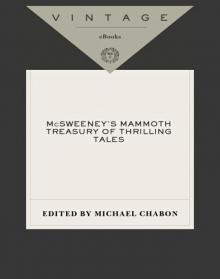 McSweeney's Mammoth Treasury of Thrilling Tales
McSweeney's Mammoth Treasury of Thrilling Tales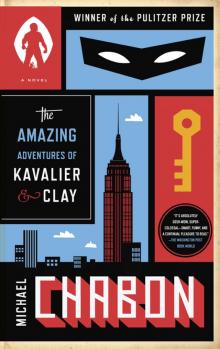 The Amazing Adventures of Kavalier & Clay
The Amazing Adventures of Kavalier & Clay The Yiddish Policemen's Union
The Yiddish Policemen's Union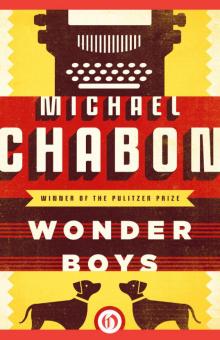 Wonder Boys
Wonder Boys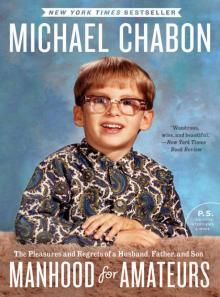 Manhood for Amateurs
Manhood for Amateurs Kingdom of Olives and Ash: Writers Confront the Occupation
Kingdom of Olives and Ash: Writers Confront the Occupation Gentlemen of the Road: A Tale of Adventure
Gentlemen of the Road: A Tale of Adventure A Model World and Other Stories
A Model World and Other Stories Pops: Fatherhood in Pieces
Pops: Fatherhood in Pieces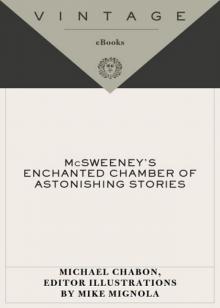 McSweeney's Enchanted Chamber of Astonishing Stories
McSweeney's Enchanted Chamber of Astonishing Stories Summerland
Summerland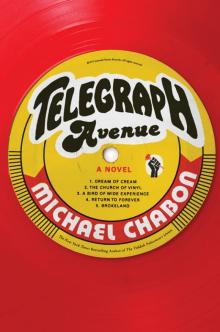 Telegraph Avenue
Telegraph Avenue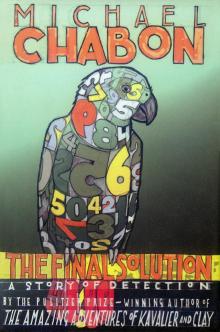 The Final Solution
The Final Solution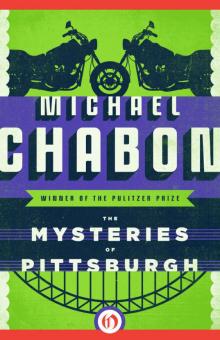 The Mysteries of Pittsburgh
The Mysteries of Pittsburgh Werewolves in Their Youth
Werewolves in Their Youth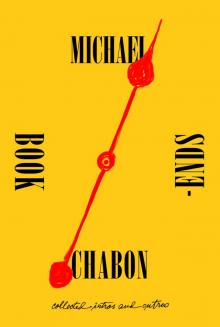 Bookends
Bookends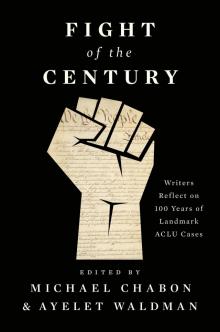 Fight of the Century
Fight of the Century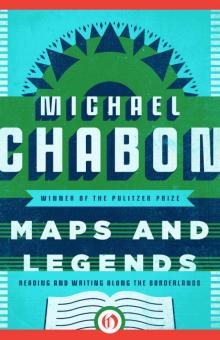 Maps and Legends
Maps and Legends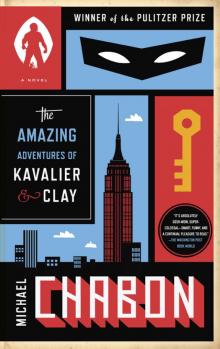 The Amazing Adventures of Kavalier & Clay (with bonus content)
The Amazing Adventures of Kavalier & Clay (with bonus content) Kingdom of Olives and Ash
Kingdom of Olives and Ash Pops
Pops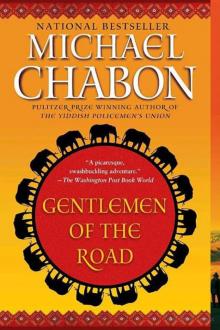 Gentlemen of the Road
Gentlemen of the Road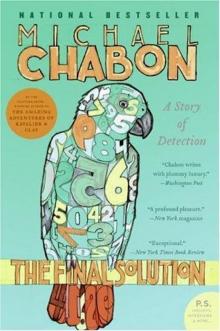 The Final Solution: A Story of Detection
The Final Solution: A Story of Detection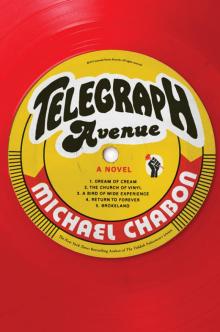 Telegraph Avenue: A Novel
Telegraph Avenue: A Novel